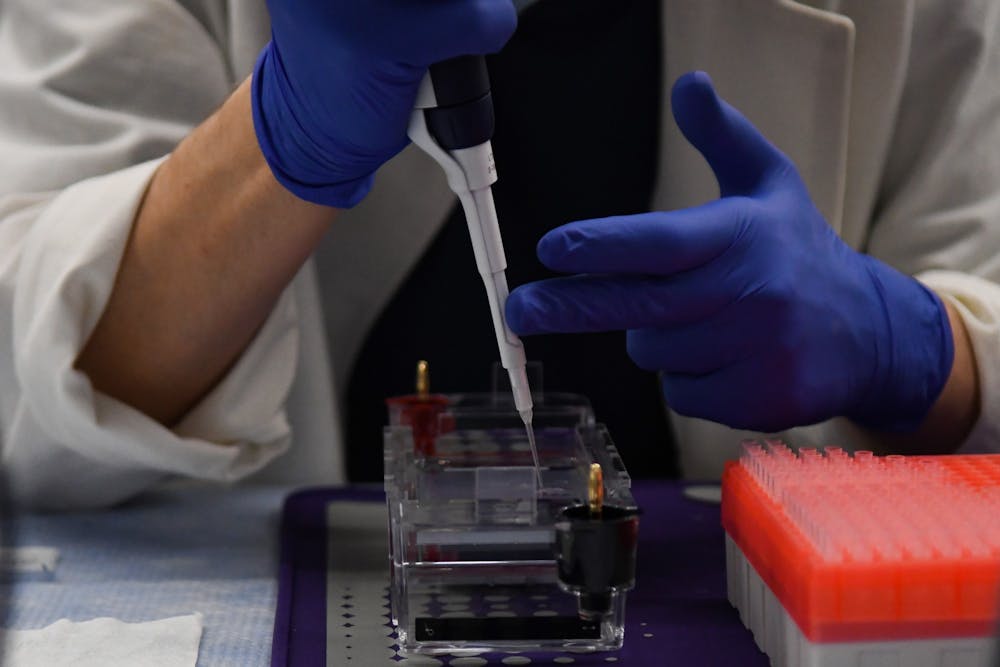
A free, online course taught by six members of Penn faculty, partnering with the virtual course provider edX, will focus on COVID-19 and the science of mRNA vaccines.
Credit: Sukhmani KaurPenn Medicine has partnered with the virtual course provider edX to launch a free virtual course taught by six Penn faculty on COVID-19 and the science behind mRNA vaccines. The instructors said they created the course in the hopes that it will help people understand the science of vaccines and encourage people to get the COVID-19 vaccine.
The virtual course, titled "The COVID-19 Pandemic and the Use of mRNA Vaccines," is headed by Professor of Medicine Drew Weissman, a pioneer researcher of mRNA vaccine technology. The asynchronous, self-guided course is hosted on the edX website, meaning students can enroll at any time, and edX estimates that it can be completed in two weeks.
There are two modules that make up the online course. The first focuses on how viral pandemics start and how they affect living bodies. The second module describes the science behind the development of the mRNA vaccines, how they work, and how they might be used in the future.
“We designed the lectures to be at the level of people who are not biology experts, because we want this to be approachable by the lay public,” Professor of Medicine Ian Frank, one of the course instructors, said. “We didn't really dumb down the science, but we tried to use language that wasn't scientific jargon and which could be easily understandable.”
Frank has been involved with helping organize clinical trials related to COVID-19 since the start of the pandemic. He is also the principal investigator of the Penn Unit within the HIV Vaccine Trials Network and HIV Prevention Trial Network, both of which have been involved with the national COVID-19 Prevention Network.
In 2005, Weissman and Katalin Karikó, another key researcher in mRNA vaccine development, published their discovery on how altering a single RNA unit reduces an inflammatory response associated with foreign mRNA and increases the production of a protein that is critical to an effective vaccine. This discovery paved the way for the creation of mRNA vaccines including the recent COVID-19 vaccines.
“Penn has really been at the forefront of this work,” Frank added.
Earlier in the year, Research Assistant Professor of Medicine Norbert Pardi, another one of the course instructors, began designing a "mechanism of action" for the course. Pardi created two short presentations on the history of mRNA vaccines, placing much importance on making the content accessible to a general audience.
“It's really hard to talk about science in a simple way,” Pardi said. “And it definitely requires some practicing. We edited the slides many, many times just to make sure because that's the most important thing. If people don't understand it, then doing the whole thing is pointless.”
While the course covers essential content related to the pandemic and the vaccines, it is difficult to keep up with the constant changes and developments in science, according to Frank.
“I would say actually, that, in some ways, the course is now a little bit behind the times,” he said. “This course is a good place to start. But if people are interested in what's current, or bigger, they need to do a little bit more research to find the most current science around particular topics.”
In addition to hoping that the course will get more people interested in learning about the science of vaccine development, both Frank and Pardi stated that they hope the course will help motivate more people to get vaccinated.
“The problem is that, in general, if people don't understand something, they refuse it,” Pardi said. “We really want to convince people that this new platform of mRNA based vaccines is a safe platform. It’s incredibly effective and we really want to share some information with them on how it was developed, and how it works.”
The Daily Pennsylvanian is an independent, student-run newspaper. Please consider making a donation to support the coverage that shapes the University. Your generosity ensures a future of strong journalism at Penn.
Donate



